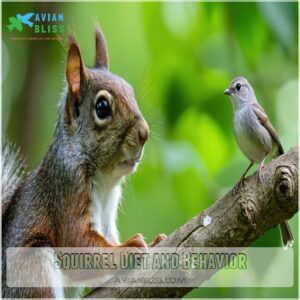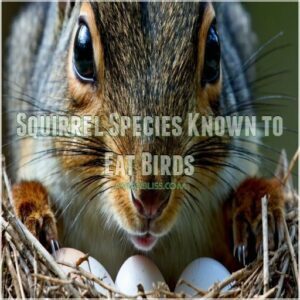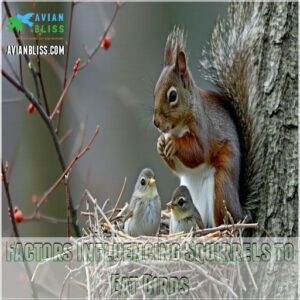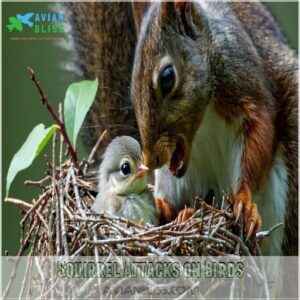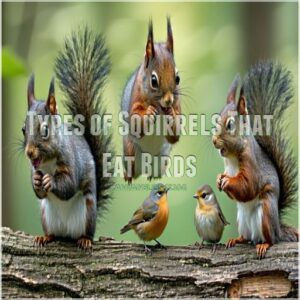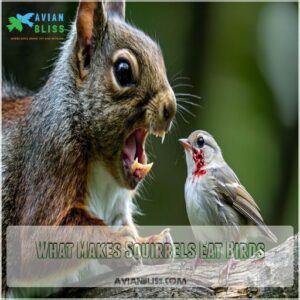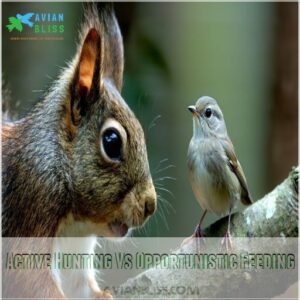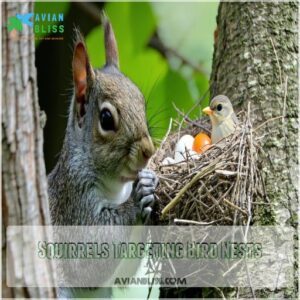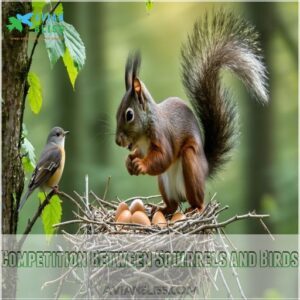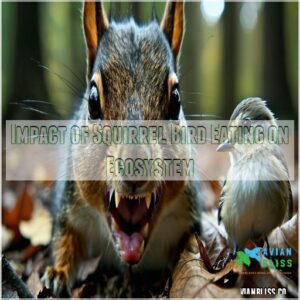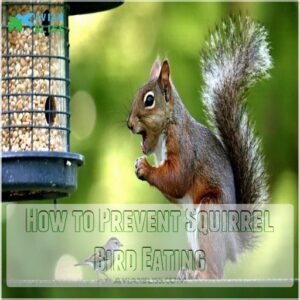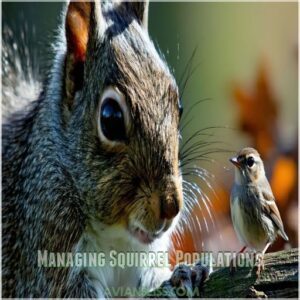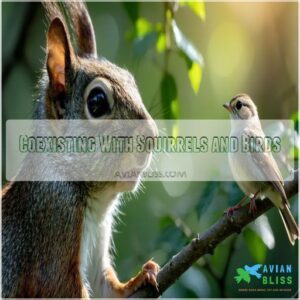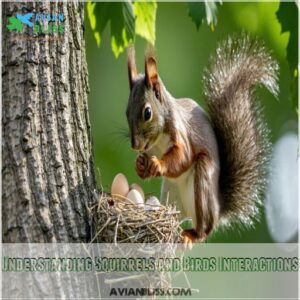This site is supported by our readers. We may earn a commission, at no cost to you, if you purchase through links.
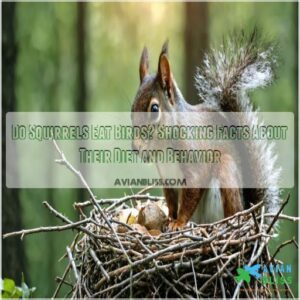
Squirrels aren’t just nut-munching woodland creatures—they’re opportunistic predators who’ll occasionally snack on birds when push comes to shove.
When their usual menu of seeds, fruits, and insects runs low, they’ll raid bird nests for eggs or even hunt vulnerable baby birds. Grey and red squirrels are the most likely culprits, especially during harsh winters when food is scarce.
It’s nature’s survival game, where these furry foragers will do whatever it takes to keep themselves fed. Think of them as the ultimate adaptable survivors of the backyard ecosystem.
Table Of Contents
- Key Takeaways
- Squirrel Diet and Behavior
- Do Squirrels Eat Birds?
- Types of Squirrels That Eat Birds
- What Makes Squirrels Eat Birds
- Squirrel Bird Eating Behavior
- Impact of Squirrel Bird Eating on Ecosystem
- How to Prevent Squirrel Bird Eating
- Managing Squirrel Populations
- Coexisting With Squirrels and Birds
- Understanding Squirrels and Birds Interactions
- Frequently Asked Questions (FAQs)
- Do squirrels kill birds?
- Do squirrels eat other animals?
- Are squirrels vegetarian?
- Is it normal for squirrels to eat birds?
- Are squirrels a threat to birds?
- What is a squirrel’s worst enemy?
- Do squirrels eat hummingbirds?
- Do squirrels harm birds?
- Do squirrels eat baby birds or eggs?
- Are squirrels afraid of birds?
- Conclusion
Key Takeaways
- You’ll discover that squirrels aren’t just innocent nut-lovers—they’re opportunistic predators who’ll eat bird eggs and chicks when food is scarce, especially during harsh winters.
- Your backyard ecosystem is more complex than you might think, with squirrels actively raiding bird nests and using their sharp claws and quick reflexes to hunt vulnerable baby birds as a protein-rich meal.
- You’ll be surprised to learn that gray and red squirrels are the most likely bird predators, turning from seemingly cute woodland creatures into strategic hunters when their usual food sources run low.
- While squirrels don’t exclusively hunt birds, they’ll readily consume eggs, chicks, and even small birds as part of their omnivorous diet—proving they’re ultimate survival experts who adapt to whatever food is available.
Squirrel Diet and Behavior
You might think squirrels stick to nuts and seeds, but their diet’s a lot more adventurous than that—they’re like the foodies of the animal world.
They’ll munch on everything from fruits and veggies to bird eggs and even the occasional unlucky critter, making them resourceful survivors with a surprising menu.
Omnivorous Diet of Squirrels
Squirrels aren’t picky eaters—they’re natural omnivores with a curious palate. While nuts and seeds top their list, they’ll surprise you by nibbling on unexpected snacks.
- Fruits like apples and peaches
- Eggs snatched from bird nests
- Fresh veggies, crunchy and delicious
- Insects, when protein’s needed
- Meat, though rarely hunted
Seasonal shifts and nutritional needs shape their choices, and sometimes, even human leftovers make the menu!
Adaptability of Squirrels to Environment
Ever notice how squirrels seem to thrive anywhere, whether in city parks or deep woods? That’s habitat adaptation in action.
They’re clever at using resources like nuts or even occasional bird eggs—whatever fits their squirrel diet.
From climate change shifts to urban survival, their flexibility shapes population dynamics and resource use.
Check this out:
| Adaptation Factor | Example Behavior | Benefit to Squirrels |
|---|---|---|
| Resource Scarcity | Foraging bird eggs | Boosts nutrition |
| Urban Environments | Raiding feeders | Expands food availability |
| Changing Seasons | Storing nuts underground | Supports winter survival |
Do Squirrels Eat Birds?
You might be surprised, but yes, squirrels sometimes eat birds!
It’s not their favorite meal, but they’re opportunistic eaters, so a tasty chick or a conveniently located egg is hard to resist for a hungry squirrel.
Squirrel Species Known to Eat Birds
With their opportunistic streak, grey squirrels, red squirrels, and flying squirrels all dabble in bird predation. Using sharp claws and quick reflexes, they raid nests or snack on baby birds when convenient.
It’s like nature’s survival buffet:
- Grey squirrels: Opportunistic and bold, they’ll raid nests for eggs or chicks.
- Red squirrels: Lean toward hunting small birds more often.
- Flying squirrels: Prefer scavenging over hunting actively.
Factors Influencing Squirrels to Eat Birds
When hunger strikes, opportunity knocks, and instinct kicks in, squirrels may eye baby birds as a quick protein-packed snack.
Limited food in their habitat forces their hand, turning nests into tiny buffets.
It’s not their first choice, but when nuts and seeds are scarce, squirrels eat birds to meet their protein needs—part survival, part opportunistic dining.
Squirrel Attacks on Birds
Squirrel attacks on birds might seem like scenes from a nature documentary, but they’re surprisingly common. Squirrel predation often involves nests, targeting vulnerable baby birds. Grey and red squirrels are particularly known for their nest raiding behavior.
- Nests raided for eggs and chicks
- Sharp claws and teeth used to kill
- Opportunistic, not aggressive hunters
- Bird defenses include alarm calls
- Human intervention limits squirrel impact
Types of Squirrels That Eat Birds
You might think of squirrels as nut-loving acrobats,
but some species occasionally add birds to their menu.
Grey, red, and flying squirrels each have their own surprising habits regarding snacking on feathered friends.
Grey Squirrels and Bird Consumption
Grey squirrels are the sneaky opportunists of the squirrel world.
Their diet leans heavily on nuts and seeds.
They’re not above raiding bird nests for eggs or even baby birds. This bird egg raiding is less about hunting and more about scavenging for quick protein fixes.
From robins to smaller backyard birds, grey squirrels often exploit easy opportunities for food.
Red Squirrels and Bird Consumption
Red squirrels have a surprising appetite for protein, often targeting birds.
Their predation includes eggs, chicks, and even small birds when food is scarce.
These feisty critters, known for their bold behavior, use sharp claws and quick reflexes as part of their hunting strategies.
Conservationists sometimes worry about their impact on bird populations, creating debates around balancing ecosystems and squirrel diet concerns.
Flying Squirrels and Bird Consumption
Unlike their tree-dwelling cousins, flying squirrels primarily dine on plants. Their flying squirrel diet consists mainly of fruits, nuts, and fungi.
However, these gliding predators aren’t strictly vegetarian; opportunistic bird predation does happen, mostly targeting eggs or already deceased birds.
Nest raiding isn’t common, but survival strategies sometimes include this unexpected addition to their menu.
So, while birds aren’t a staple in their squirrel diet, they’re occasionally on the menu. Think of it as a delicious, protein-packed side dish for these aerial acrobats.
What Makes Squirrels Eat Birds
You might think squirrels stick to nuts and seeds, but when food becomes scarce, they’ll get surprisingly creative.
Even eating birds.
It’s all about survival, as opportunities like bird eggs or chicks offer an easy, protein-packed meal when other options run out.
Availability of Food Sources
When food scarcity hits, squirrels adapt fast. Seasonal changes and competition levels push them to explore every option, including birds as squirrel food.
In a similar predator-prey dynamic, birds eating butterflies also face adaptations, where birds regulate butterfly populations.
Human impact like habitat changes or feeders running empty can ramp up squirrel predation of birds.
Foraging strategies shift—they’ll raid nests for eggs or common prey birds, proving their diet adjusts to what’s available.
Nutritional Value of Birds
Squirrels don’t just nibble on nuts; birds bring serious nutritional perks to the table.
Packed with bird protein, essential fats, and calcium sources, birds as squirrel food offer a high-value snack, which can be attributed to the high-quality protein found in bird protein supplements.
For a squirrel, adding avian nutrients to their diet can boost survival, especially during hard times.
It’s nature’s way of serving a protein-rich buffet!
Opportunities for Squirrel Predation
Imagine this: you’re in a quiet forest, but squirrels are stealthy opportunists.
Predation triggers, like prey vulnerability or habitat impact, draw them to nests.
Seasonal variations and food shortages often nudge them into action.
Squirrels eat birds—especially chicks or eggs—when hunger strikes. Squirrels eat birds.
Sometimes human influence, like bird feeders, unintentionally sets the stage for surprising squirrel attacks on birds. surprising squirrel attacks.
Squirrel Bird Eating Behavior
Regarding squirrels eating birds, their behavior is a mix of crafty opportunism and instinct.
Whether they’re raiding nests for eggs or snagging a quick meal, squirrels treat bird-eating more like a bonus snack than a main course.
Active Hunting Vs Opportunistic Feeding
Imagine a stealthy squirrel sizing up a bird—it’s not always about the hunt. Active hunting is rare, as squirrels prefer opportunistic feeding to conserve energy. Why chase when leftovers work? They assess prey based on risk and survival advantage.
- Hunting Strategies: Rare but possible for survival.
- Energy Expenditure: Minimal effort preferred.
- Prey Choice: Easy-to-capture targets win.
Squirrels Targeting Bird Nests
Ever wonder how those fluffy-tailed bandits get their protein? Sometimes, it’s from a bird’s nest! They’re not always opportunistic; sometimes, they actively target nests.
This sneaky behavior isn’t just about a quick snack; it impacts bird populations.
| Nest Raiding Tactics | Chick Predation | Egg Consumption |
| Stealthy approaches | Swift grabs | Shell cracking skills |
| Surprise attacks | Tiny claws | Quick meals |
It’s a sad but true story for some baby birds.
Competition Between Squirrels and Birds
Birds and squirrels aren’t exactly best friends regarding food competition.
Their habitat overlap often leads to a squirrel-bird relationship full of squabbles.
From raiding birdfeeders to nest predation, squirrels eat birds or eggs when resources run low.
This squirrel-bird conflict isn’t just about survival strategies—it’s a wild game of who eats first at nature’s buffet.
Impact of Squirrel Bird Eating on Ecosystem
You mightn’t think squirrels munching on birds could shake up the ecosystem, but it actually changes more than you’d expect.
By snacking on birds, squirrels can disrupt seed dispersal and nutrient cycling.
which keeps forests growing and balanced—kind of like messing with nature’s to-do list.
Seed Dispersal and Forest Regeneration
You might think squirrels eating birds is all bad news, but their knack for burying acorns actually shapes forests.
Imagine this: a squirrel stashes an acorn, forgets it, and voilà—an oak tree sprouts. That seed burial fuels forest growth, boosting the ecosystem.
While their squirrel diet includes birds sometimes, their role in seed dispersal outweighs the impact.
It’s like nature’s quirky balance, where squirrels keep forests thriving with accidental gardening.
Nutrient Cycling and Ecosystem Balance
When squirrels sneak a bird from the menu, it’s like shaking up the nutrient flow buffet.
This predator-prey behavior ties into the broader ecosystem impact, similar to how birds play a key role in dispersing seeds and nuts, aiding forest regeneration as ecosystem architects.
Leftover scraps enrich soil, boosting forest health. Pair that with their clumsy seed dispersal, and squirrels become tiny gardeners.
Sure, squirrel diet birds scenarios stir chatter, but they’re ensuring nothing’s wasted.
A squirrel’s opportunistic appetite helps balance food webs, especially during food scarcity or wild animal competition.
How to Prevent Squirrel Bird Eating
If you’ve discovered that squirrels are turning your backyard bird sanctuary into their personal buffet, don’t panic—there are effective strategies to protect your feathered friends.
By implementing smart deterrents and creating squirrel-friendly alternatives, you’ll transform your outdoor space into a peaceful haven where birds can feast without fear of these furry opportunistic hunters.
Protecting your birds from squirrels is achievable.
Squirrel-Proof Bird Feeders
Three innovative feeder designs might just save your backyard bird sanctuary from squirrel invasions.
Crafting strategic barriers means outsmarting these clever critters who see your birdseed as an all-you-can-eat buffet.
Invest in baffles that spin, slide, or tilt – creating an acrobatic challenge that’ll leave squirrels frustrated and your feathered friends safe from these opportunistic predators.
Using Squirrel Deterrents
After fortifying your bird feeders, outsmarting squirrels becomes your next mission. These furry infiltrators require strategic deterrence to protect feathered friends.
Consider these proven squirrel-stopping tactics:
- Sprinkle cayenne pepper around feeding areas to create a spicy barrier
- Install motion-activated sprinklers that startle squirrel invaders
- Use ultrasonic devices emitting high-frequency sounds repelling squirrels
Defend your avian sanctuary with science-backed, humane solutions that keep everyone safe.
Providing Alternative Food Sources
Instead of letting squirrels raid bird feeders, set up their own buffet zone with squirrel-friendly alternative seed mixes.
Scatter nuts, fruits, and veggie treats away from bird areas to keep them happily munching.
Create DIY feeders that encourage natural foraging behaviors, giving these furry acrobats a nutritious distraction from feathered friends.
Managing Squirrel Populations
If you’re battling backyard bird-munching squirrels, don’t panic—there are plenty of humane ways to manage these furry opportunists.
You’ll learn how strategic planting, community education, and clever deterrent techniques can help you create a harmonious habitat where both squirrels and birds can thrive.
Non-Lethal Control Methods
Ready to outsmart those nest-raiding squirrels? Non-lethal control methods can save your feathered friends without harming the furry troublemakers.
Use repellent sprays around bird feeders to discourage squirrel attacks.
Modify habitats by creating distance between feeding stations and potential squirrel launching pads.
Offer alternative food sources away from bird nesting areas to redirect their hungry appetites and protect vulnerable baby birds.
Squirrel-Resistant Planting
Deter those seed-snatching acrobats by strategically planting nature’s squirrel repellents!
Choose strong-smelling herbs like mint and lavender, which make your garden feel less like an all-you-can-eat buffet.
Surround vulnerable plants with daffodil bulbs – squirrels hate their toxic taste.
Create physical barriers using wire mesh or rocks, making your garden a fortress that even the craftiest squirrel can’t breach.
Community Engagement and Education
Three key strategies can transform your community’s approach to squirrel-bird interactions.
Organize local squirrel workshops that educate residents about how squirrels eat birds and ecological relationships.
Host nature walks where participants learn about squirrel bird encounters through hands-on experiences.
Launch school programs and community forums to spread awareness about these surprising predatory behaviors, turning scientific knowledge into engaging community conversations.
Coexisting With Squirrels and Birds
You’ll be amazed to discover that your backyard isn’t just a peaceful sanctuary, but a complex ecosystem.
where squirrels and birds engage in an intricate dance of survival and coexistence.
By understanding their interactions, you can create a harmonious environment that supports both species and transforms your outdoor space into a thriving wildlife haven.
Balancing Squirrel and Bird Populations
Woodland wildlife-watchers know balancing squirrel and bird populations is like walking a tightrope over an ecological circus. One effective approach to minimize competition is using squirrel bird deterrent to safeguard bird populations.
Understanding the delicate dance between these furry and feathered friends requires strategic thinking:
- Monitor food source distribution
- Track population density
- Minimize territorial conflicts
- Implement non-invasive management techniques
Nature’s harmony depends on our thoughtful intervention, turning potential predator-prey tension into a collaborative ecosystem survival strategy.
Creating Squirrel-Friendly Habitats
Want to roll out the red carpet for your bushy-tailed neighbors?
Creating squirrel-friendly habitats starts with strategic nesting boxes placed away from bird territories.
Provide diverse food sources like nuts, seeds, and fruits in dedicated feeders.
Make certain safe water access with shallow dishes, and choose native plants that offer both shelter and natural food sources for these agile woodland acrobats.
Promoting Ecological Harmony
Ready to play peacekeeper between your backyard’s furry and feathered friends? Creating harmony isn’t rocket science.
Here’s how to balance your wildlife neighborhood: By using techniques like visual deterrents, such as Terror Eyes balloons for garden protection, you can minimize conflicts and create a safe space.
- Design multi-species friendly spaces
- Provide separate feeding zones
- Minimize habitat disruptions
- Encourage natural predator-prey relationships
By understanding squirrel-bird interactions, you’ll transform your outdoor space into a thriving ecosystem where everyone gets along – without becoming someone else’s lunch.
Understanding Squirrels and Birds Interactions
You might be surprised to learn that squirrels, those cute fuzzy creatures darting around your backyard, aren’t always the innocent nut-munchers you thought they were.
When food gets scarce, these nimble rodents can transform from seed-lovers to opportunistic predators.
Sometimes targeting unsuspecting bird eggs, chicks, and even small adult birds.
Observing Squirrel Behavior
Ever caught a squirrel red-handed during its daily drama?
These acrobatic critters communicate through tail flicks, chirps, and body language that’d make a spy jealous.
They’re masters of their environment, mapping out foraging routes with lightning-quick precision, and they seem to know that birds have a natural fear of predators like owls, which is triggered by silent flight and piercing gaze.
Watch how they scan their surroundings, dodge predators, and navigate complex social structures that reveal their surprising adaptability and survival instincts.
Studying Bird Migration Patterns
During bird migration seasons, researchers dive deep into understanding how shifting patterns might influence squirrel and bird interactions across diverse ecosystems.
Climate changes dramatically reshape migration routes, creating unique challenges for both species.
- Tracking technologies reveal intricate movement patterns
- Habitat transformations impact migration timing
- Climate effects trigger unexpected ecological shifts
These dynamic changes underscore the complex relationship between squirrels and migrating birds.
Analyzing Squirrel-Bird Interactions
As bird migration wanes, scientists zoom in on the intricate dance between squirrels and their feathered neighbors.
Squirrel predation reveals a complex web of survival tactics, where habitat overlap sparks intense food competition.
In some cases, a squirrel’s diet may even include birds, as seen in products related to squirrel eats birds.
Researchers uncover shocking insights into how these nimble rodents interact with birds, sometimes turning from seed-gatherers to unexpected predators in the blink of an eye.
Frequently Asked Questions (FAQs)
Do squirrels kill birds?
You might think squirrels are just cute, nut-munching critters,
but they’ve got a wild side. When hunger strikes or opportunity knocks,
these furry opportunists won’t hesitate to snatch a bird or its eggs for a protein-packed snack. a protein-packed snack.
Do squirrels eat other animals?
Squirrels aren’t just nut-munching woodland creatures.
They’re opportunistic omnivores who’ll chow down on insects, eggs, and small animals when hunger strikes.
Their diet’s more diverse than you’d think, proving these furry foragers are full of surprises. opportunistic omnivores full of surprises
Are squirrels vegetarian?
Ironically, those cute, nut-munching critters aren’t strictly vegetarian.
They’ll munch on eggs, small birds, and even insects when hunger strikes, revealing a surprising carnivorous side to these seemingly innocent woodland creatures.
Is it normal for squirrels to eat birds?
If nature’s buffet looks slim, these furry foragers won’t hesitate to munch on feathered friends.
They’re opportunistic eaters, nabbing eggs and chicks when hunger strikes, proving squirrels aren’t just nut-loving vegetarians.
Are squirrels a threat to birds?
Your backyard birds might be in for a surprise!
Squirrels aren’t just cute nut-lovers – they’ll snatch eggs and chicks when hunger strikes.
These opportunistic predators can definitely pose a threat to your feathered friends. Squirrels are a threat.
What is a squirrel’s worst enemy?
Dogs, hawks, and bobcats are a squirrel’s worst nightmares.
They’re the top predators that’ll chase you down, turning your peaceful tree-hopping life into a high-stakes survival game where one wrong move means you’re dinner.
Do squirrels eat hummingbirds?
While tiny hummingbirds might seem vulnerable, squirrels rarely hunt them.
They’re more likely to compete for nectar sources near feeders, but direct predation is uncommon.
Their diet primarily focuses on nuts, seeds, and occasional small insects.
Do squirrels harm birds?
Squirrels can definitely harm birds by raiding nests, stealing eggs, and occasionally killing chicks.
They’re opportunistic predators.
They’ll snatch vulnerable birds when hunger strikes or food’s scarce, turning from cute garden visitors into unexpected hunters.
Do squirrels eat baby birds or eggs?
With nature’s unexpected twist, squirrels aren’t just cute nut-hoarders.
They’ll raid bird nests for protein-packed eggs and helpless chicks.
Your backyard’s seemingly innocent wildlife scene can turn into a survival buffet where tiny predators strike when you least expect.
Are squirrels afraid of birds?
Don’t assume squirrels are bird wimps!
They’re surprisingly bold predators.
who often share territories with birds.
Your backyard feathered friends might actually be more cautious.
around these agile, opportunistic rodents who aren’t easily intimidated.
Conclusion
Imagine squirrels as nature’s opportunistic survivors, where their diet isn’t just about nuts and seeds.
When you understand that squirrels eat birds, you’re witnessing an incredible survival strategy.
These furry foragers adapt quickly, targeting bird eggs and nestlings during food scarcity.
While it might seem shocking, this behavior maintains ecological balance.
By recognizing squirrels’ complex dietary habits, you’ll appreciate their remarkable resilience in the wild ecosystem, where survival trumps our preconceived notions about these fascinating creatures.

